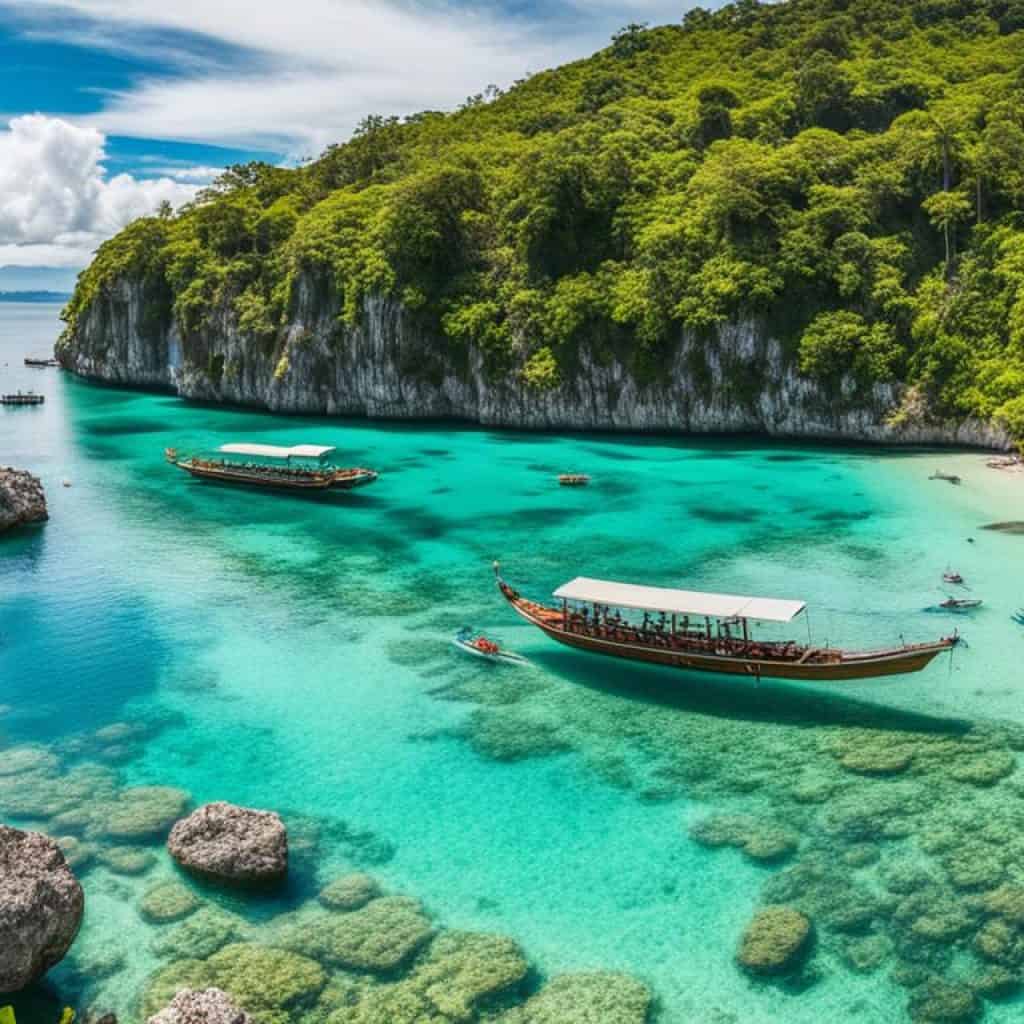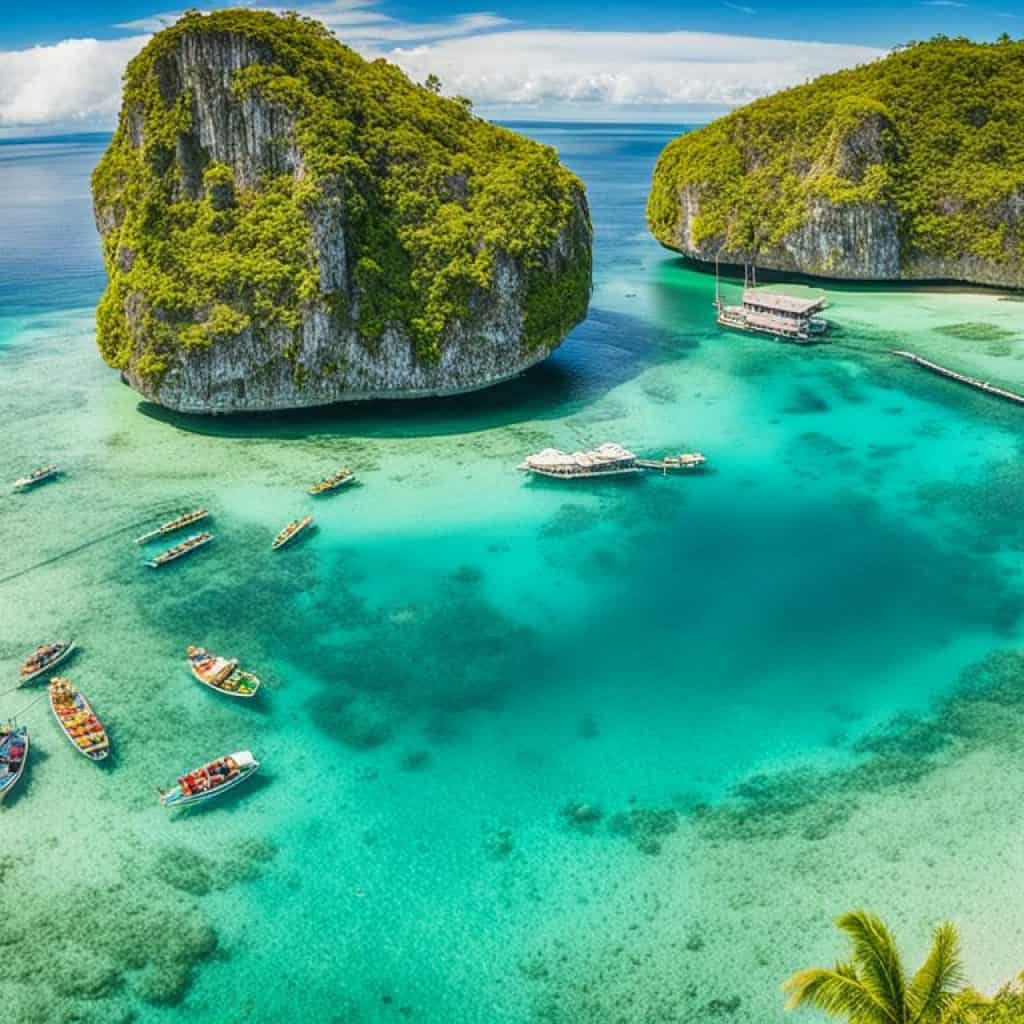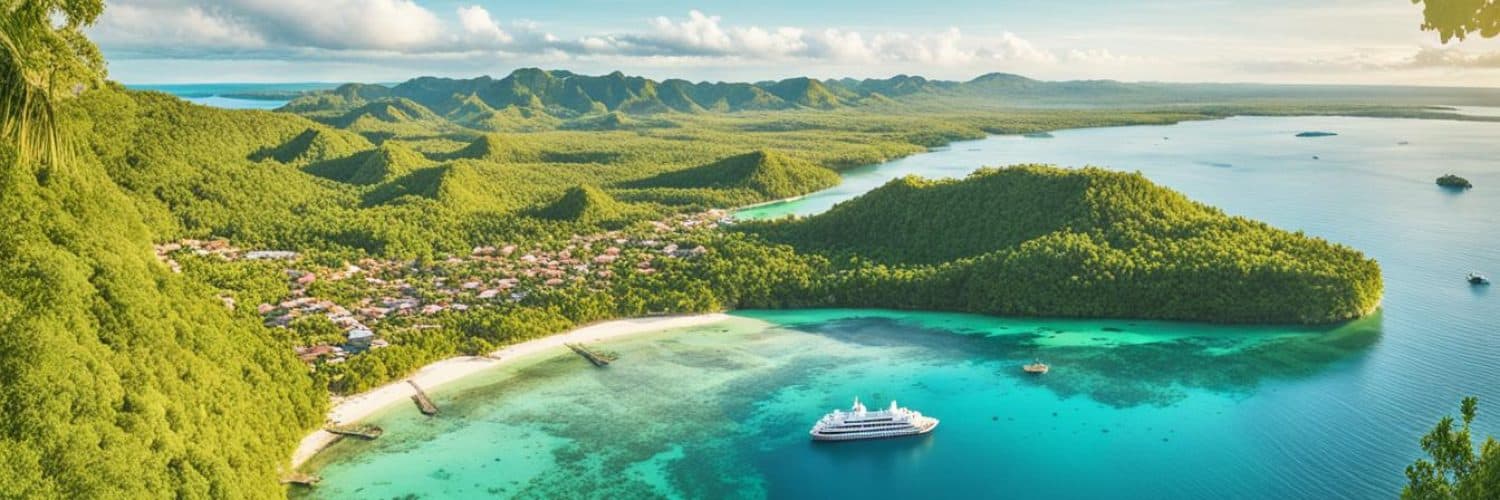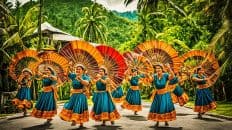Ever wondered if Bohol lies within Cebu? It’s a common guess, seeing both as close neighbors in the Philippines. This article will explore how Bohol and Cebu are linked and what makes them unique. Get ready to learn surprising facts and appreciate both places’ special qualities.
Key Takeaways:
- Bohol and Cebu are neighboring provinces in the Central Visayas region of the Philippines.
- Though Bohol is near Cebu, it stands as its own province.
- Bohol boasts a rich history, culture, and attractions like the Chocolate Hills.
- Cebu is a lively city known for exciting festivals and landmarks like Magellan’s Cross.
- Both contribute significantly to the Philippines’ economy and host educational and healthcare facilities.
Geography of Bohol and Cebu
Bohol and Cebu are close neighbors in the Philippines’ Visayas region. Bohol looks like an oval and sits between Cebu and Leyte. It’s 700 kilometers from Manila and about 70 kilometers from Cebu City.
Bohol is made up of a big island plus 167 tiny islands. Cebu is right next to Bohol, towards the northwest. It’s Cebu province’s capital and the area’s business hub.
| Bohol | Cebu |
|---|---|
| Located between Cebu and Leyte | Northwest of Bohol |
| Main island and 167 smaller islands and islets | Capital city of Cebu province |
| About 700 kilometers south of Manila | Main center of commerce, trade, and industry in the region |
| Approximately 70 kilometers southeast of Cebu City |
History of Bohol
Bohol’s history dates back to before the Spaniards arrived in 1521. The island was home to the Pintados, known for their tattoos. They had their own culture and language, adding to the region’s richness.
The Spaniards came to Bohol in 1565, starting a critical era. Miguel López de Legazpi’s arrival in Jagna was pivotal. Bohol then evolved over the years, becoming a Jesuit mission in 1595. It was part of Cebu but became independent in 1854.
“Bohol has a rich history that showcases the resilience and diversity of its people. From the pre-Hispanic era to the Spanish colonial period, the island has witnessed the ebb and flow of cultures and influences.”
The past has influenced what Bohol is today. A mix of old and new defines its identity. By understanding its history, we gain a deep appreciation for its culture and stories.
Historical Relationship Between Bohol and Cebu
Bohol and Cebu are linked by a long history that started in the early Spanish era in the Philippines. The Spanish conquistadors visited both places. They made contact with local leaders.
In 1565, a key event called the blood compact happened. It was between Miguel López de Legazpi, a Spanish explorer, and Bohol’s chiefs. This act was a sign of friendship and alliance between the Spaniards and Bohol’s indigenous leaders.
“The blood compact between López de Legazpi and the chiefs of Bohol shows the strong bond and friendship between the Spanish and Bohol’s people.”
Bohol and Cebu, as neighbors in the Visayan region, share much in culture and language. They both are part of the Visayan group. Most people in both provinces speak Cebuano.
The history between Bohol and Cebu has helped shape Visayan culture and tradition. It adds to their regional identity and unity.
Shared Cultural and Linguistic Similarities
Bohol and Cebu are similar in culture and language because of their closeness and shared history. These similarities show in their festivals, music, dances, and food. They highlight the lively culture of the Visayan people.
The Sinulog Festival in Cebu and the Sandugo Festival in Bohol are big events. They celebrate their shared history and culture. These festivals have bright parades, street dances, and cultural shows that showcase the region’s customs and traditions.
Also, both Bohol and Cebu are famous for their delicious food. Dishes like lechon, kinilaw, and sikwate are popular among locals and visitors. They represent the distinct taste of Visayan cuisine.
Influences on Arts and Architecture
The connection between Bohol and Cebu has also influenced the arts and architecture of the area. Spanish rule introduced Christianity and European building styles.
The Baclayon Church in Bohol and the Basilica del Santo Niño in Cebu show Spanish colonial architecture. These churches are important for both religion and history. They blend Spanish and local design elements.
Thus, the bond between Bohol and Cebu has deeply affected the culture, language, and architecture of both areas. Their shared past continues to influence the identity of the Visayan region in the Philippines.
Bohol’s Unique Attractions
Bohol is not part of Cebu, but it has amazing attractions. It draws visitors from everywhere. Whether you love adventures, nature, or history, Bohol has something for you.
1. The Majestic Chocolate Hills
The Chocolate Hills are a famous site in Bohol. They are made of over 1,000 hills that look like chocolate mounds in the dry season.
2. Pristine White Sand Beaches
Stunning white sand beaches make Bohol a perfect tropical getaway. Alona Beach and Panglao Island have clear waters and coral reefs. They are great for snorkeling and diving.
3. Encounter the Tarsiers
Meeting tarsiers, the world’s smallest primates, is a must in Bohol. You can see them at the Tarsier Sanctuary. There, you can watch them and learn about saving them.
4. Enjoy a Scenic Loboc River Cruise
Taking a cruise along the Loboc River is a beautiful experience. On a floating restaurant, you get to eat well and see beautiful views of nature and village life.
5. Discover the Historic Baclayon Church
The Baclayon Church is one of the oldest in the Philippines. It shows Bohol’s history through its architecture and interior.
Bohol has many attractions that stand out. It offers a mix of natural beauty and cultural sights. Bohol is perfect for anyone wanting adventure, peace, or to explore.
Cebu’s Unique Charms
Cebu is a treasure trove of attractions that charm every traveler. Its rich history and vibrant culture are unmatched. Explore its remarkable tourist spots and enjoy exciting attractions.
Magellan’s Cross
Magellan’s Cross is a landmark filled with history in Cebu City. It marks Christianity’s arrival in the Philippines. One visit gives a glimpse into the country’s colonial past, essential for history lovers.

Sinulog Festival
Don’t miss the Sinulog Festival if you’re in Cebu in January. This grand event honors the Santo Niño. It features drum beats and colorful street performances. It’s a celebration of Cebu’s religious and cultural heritage.
Cebu Taoist Temple
The Cebu Taoist Temple offers an unmatched cultural experience. Located in Beverly Hills, Cebu City, it’s a place of worship for the Cebuano Chinese community. Admire its architecture, enjoy the peaceful surroundings, and view the city from this serene spot.
Fort San Pedro
Fort San Pedro stands in the heart of Cebu City, showcasing its historical value. Built in the 16th century, it protected against pirates and invaders. Visitors can explore its walls, stroll in the gardens, and see artifacts in the museum.
Basilica del Santo Niño
Seeing the Basilica del Santo Niño is a must in Cebu. This church is home to the Philippines’ oldest religious symbol, the Santo Niño de Cebu. Step inside to admire its beauty, attend mass, or light a candle for your prayers.
Cebu’s charms reflect its rich heritage and vibrant culture. With historic sites and lively festivals, it offers something for everyone.
Economic Importance of Bohol and Cebu
Both Bohol and Cebu are key to the Philippines’ economy. Cebu is a center for business services, tourism, and more. It has the second busiest airport.
Bohol is booming in tourism and agriculture. It’s famous for beautiful beaches and the Chocolate Hills. The culture there is rich.
Here’s a quick look at their major industries:
| Bohol | Cebu |
|---|---|
|
|
Bohol and Cebu boost the national economy and create jobs. Their locations, resources, and industries are crucial for the Philippines.
Cultural Similarities Between Bohol and Cebu
Bohol and Cebu are neighboring provinces with deep historical ties. They share several cultural similarities. One major similarity is the language – Cebuano. It’s widely spoken in Visayas and Mindanao. Being the main language in both Bohol and Cebu, it unites the people. This common language makes it easy for them to communicate and share cultures.
Both provinces are also known for their colorful and vibrant festivals. In Bohol, the Sandugo Festival celebrates a historic blood compact. Meanwhile, Cebu’s Sinulog Festival marks their conversion to Christianity. These events are full of colorful parades, dances, and religious ceremonies. They let everyone experience each province’s unique culture.
Despite their similarities, Bohol and Cebu have their own unique traits. They each have different traditions, foods, and historic sites. This diversity makes the Visayas region’s culture even richer. It offers a variety of experiences to those who visit Bohol and Cebu.
| Similarities Between Bohol and Cebu | Differences Between Bohol and Cebu |
|---|---|
| Both provinces speak Cebuano, a widely used language in the Visayas and Mindanao regions. | Each province has its own distinct cultural heritage and traditions. |
| Bohol and Cebu share vibrant festivals that showcase their cultural traditions. | Bohol and Cebu have unique festivals that highlight their individual histories and religious practices. |
| Both provinces have a rich culinary heritage, incorporating local ingredients and flavors. | Bohol and Cebu have their own distinct culinary specialties and signature dishes. |
| Bohol and Cebu share historical landmarks that reflect their shared history. | Each province has its own iconic landmarks and historical sites. |
| Both provinces have a deep-rooted sense of pride in their cultural traditions. | While similar in some aspects, Bohol and Cebu maintain their individual cultural identities. |
Despite the similarities and differences, the cultural bond between Bohol and Cebu is strong. Exploring their shared and unique cultures lets us appreciate the Visayas region’s diversity. This region in the Philippines is rich in culture thanks to places like Bohol and Cebu.
Tourism in Bohol and Cebu
Tourism thrives in Bohol and Cebu, drawing thousands yearly. They offer breathtaking destinations, from natural wonders to historical sites.
In Bohol, the Chocolate Hills are a must-see. These hills turn brown in the dry season, looking like chocolate. Nature lovers and photographers find it awe-inspiring.
Bohol also has beautiful beaches. Alona Beach and Panglao Island are perfect for sunbathing and water sports.
The tarsier sanctuary delights wildlife fans. Visitors see the unique primates with large eyes in their natural setting.
“Bohol’s Chocolate Hills, stunning beaches, and unique wildlife make it a dream destination for nature lovers.”
Cebu has its own charms. It’s rich in culture, with landmarks like Magellan’s Cross. This symbolizes Christianity’s arrival in the Philippines.
The Sinulog Festival in January attracts many. It’s a grand event with dances and music, honoring the Santo Niño.
Visitors explore Cebu City’s culture at the Cebu Taoist Temple and the Basilica del Santo Niño, the country’s oldest Catholic church.
Cebu blends modernity with tradition, offering a memorable experience.
“Cebu’s vibrant festivals and cultural landmarks make it a must-visit destination for those seeking a colorful and diverse experience.”
Bohol and Cebu play a big role in tourism. They blend natural beauty, culture, and hospitality. This makes them great for travelers seeking unforgettable adventures in the Philippines.
| Bohol | Cebu |
|---|---|
| Chocolate Hills | Magellan’s Cross |
| Pristine Beaches | Sinulog Festival |
| Tarsier Sanctuary | Cebu Taoist Temple |
Choosing between Bohol’s natural wonders and Cebu’s cultural events promises an unforgettable journey. Both showcase the Philippines’ beauty and charm.
Transportation Between Bohol and Cebu
Traveling between Bohol and Cebu offers several good options. You can be a tourist or a local. Everyone can pick from a ferry or a flight to get to their destination.
Taking a ferry is the most common and liked way to travel between the two places. Various ferry companies run frequent trips. These create a reliable and enjoyable journey that lasts about two hours. This gives you the chance to see the beautiful sea around you.
For those who want to get there faster, there’s a flight option. It takes off from Bohol’s Tagbilaran Airport and lands at Cebu’s Mactan–Cebu International Airport. This quick flight only takes about 30 minutes. It’s a fast and convenient way to travel.
Both the ferry and the flight are great choices for everyone. You can pick the calm ferry ride or the quick flight. Either way, your trip between Bohol and Cebu will be easy and stress-free.
Are you ready to see the beautiful sights of Bohol or dive into Cebu’s rich culture? Know that getting between these two provinces is easy. It promises a smooth and fun journey for your adventure.
Local Cuisine in Bohol and Cebu
Bohol and Cebu are great places to try unique, flavorful dishes. Each place has its special dishes made from local ingredients. These dishes show the rich tastes of the region.
Bohol Local Cuisine
In Bohol, you’ll find a variety of dishes. These dishes use fresh seafood and local crops. Try kinilaw, which is raw seafood soaked in vinegar and spices. It’s a tangy and zesty starter. Also, don’t miss sikwate, a local hot chocolate. It’s made from rich cacao beans and is perfect with suman, a sticky rice treat.
“The flavors of Bohol’s local cuisine will surely leave you wanting more.”
Another Bohol special is binagol. It’s a sweet sticky rice cake with coconut. Enjoy this treat as a dessert or a snack. These dishes reflect Bohol’s traditional cooking and local products.
Cebu Local Cuisine
Cebu is known for its delicious dishes that attract both locals and visitors. The most famous dish is lechon. It’s a whole roasted pig that is crispy outside and juicy inside. Lechon is a highlight at many celebrations.
For a mix of tastes, try sutukil. It’s a trio of seafood dishes: sinugba (grilled), tinola (soup), and kilawin (marinated in vinegar). This combination offers a taste of Cebu’s fresh seafood.
“Cebu’s local cuisine is a tantalizing fusion of flavors that will satisfy even the most discerning palate.”
Cebu’s dried mangoes are also a must-try. They’re known for their sweet yet tart flavor. These mangoes are great as gifts or snacks.
Exploring the local cuisine is key to experiencing Bohol and Cebu. From spicy kinilaw to juicy lechon, both places deliver unforgettable culinary adventures. They’ll definitely make you want more.
Education and Healthcare in Bohol and Cebu
Bohol and Cebu work hard to offer top-notch education and healthcare. They have a wide range of schools and health facilities for their people.
Education in Bohol and Cebu
Students in Bohol and Cebu have lots of choices for their studies. They can pick from universities, colleges, and vocational schools. These places focus on giving them the knowledge and skills for their future jobs.
The education in these areas helps people support their communities. Bohol and Cebu believe in building a learning culture for better personal growth.
Healthcare in Bohol and Cebu
Health and wellness are key for Bohol and Cebu. They make sure everyone can get to hospitals and clinics easily.
Bohol and Cebu’s medical staff are well-trained to provide the best care. They offer a wide variety of services, from simple check-ups to complex treatments.
Collaboration and Improvement
Bohol and Cebu want to keep making their education and healthcare better. They work with many groups to improve these critical services.
| Education | Healthcare |
|---|---|
| Universities | Hospitals |
| Colleges | Clinics |
| Vocational Schools | Medical Centers |
Together, Bohol and Cebu ensure their people have good education and healthcare. This care helps their communities thrive and grow. It paves the way for a hopeful future for everyone.
Government and Politics in Bohol and Cebu
Bohol and Cebu have their unique governments and politics. Bohol is run by the Sangguniang Panlalawigan with a governor as its leader. Cebu City, being independent, has its own government separate from Cebu’s province. The Sangguniang Panlungsod leads it, and the mayor is in charge.
Bohol and Cebu have a lively political scene with many parties and leaders. Bohol’s government aims to meet its people’s needs through policies and actions. Cebu City focuses on challenges and chances that come with being a city.
“The strength of a government lies in its ability to address the diverse needs of its people and foster an environment of progress and empowerment.”
Voting and taking part in politics is key to Bohol and Cebu’s democracy. Elections let people pick their leaders. This ensures the people’s voices are heard by their governments.
Bohol and Cebu work to improve social welfare, economic growth, and sustainable development. Officials in both places try their best to serve the community and aim for a bright future.
Government Structure in Bohol
In Bohol, the Sangguniang Panlalawigan is the main government body. It consists of board members voted in by Bohol’s people. The governor leads the government, focusing on policies and the province’s daily management.
Government Structure in Cebu City
Cebu City stands apart with its own government, not tied to Cebu province. It’s run by the Sangguniang Panlungsod. The mayor oversees the city’s management and governance.
Bohol and Cebu’s governments are key to their growth and success. Their dedication to serving the public and governing well helps their communities thrive.
Future Development Plans for Bohol and Cebu
Bohol and Cebu plan to boost their infrastructure for sustainable growth. They aim to attract more business, improve transport, and increase investments. Let’s delve into their future development plans.
Bohol Development Plans
Bohol is focusing on enhancing transportation and promoting tourism. A key priority is improving roads, bridges, and the Tagbilaran Airport. This will better connect the province and support more flights.
The province also plans to set up tourism zones. These zones will have top-notch hotels, fun activities, and green attractions. They aim to draw in more tourists.
Additionally, Bohol is working on its water and sanitation. It’s investing in water projects and using sustainable methods. This will help keep clean water available for the long-term.
Cebu Development Plans
Cebu is working to cement its role as a major economic player. It plans to expand the Mactan–Cebu International Airport for more passengers. This will help manage the increasing air traffic.
Improving roads is another focus for Cebu. By investing in infrastructure, it wants to reduce traffic and make transportation smoother. This is key for better logistics and operations.
Additionally, Cebu is trying to attract more business investment. It provides good policies and incentives for entrepreneurs. This will help create jobs and boost the economy.
Future Collaboration Between Bohol and Cebu
Bohol and Cebu are neighboring provinces in the Visayas region. They have the potential for fruitful collaboration and strong partnership. By working together in different sectors, they can boost their growth.
One key area for collaboration is promoting tourism. By highlighting their unique attractions and launching joint marketing campaigns, they can attract more visitors. They can introduce tour packages that cover both Bohol and Cebu, offering travelers a seamless experience.
Trade exchanges between Bohol and Cebu can also strengthen their economic relationship. By focusing on complementary industries and building a cooperative network, businesses in both provinces can benefit. This collaboration can lead to the development of supply chains that support sustainable regional growth.
Joint Initiatives
Cultural exchange programs can help bring Bohol and Cebu closer. Organizing events that celebrate their shared heritage can promote mutual appreciation. Such efforts can also boost the tourism sector by attracting cultural enthusiasts globally.
Collaboration in infrastructure can bring significant benefits. By investing together in transportation improvements, both provinces can become more connected. This enhances trade, tourism, and overall economic progress.
| Collaborative Areas | Benefits |
|---|---|
| Tourism Promotion | Increased tourist arrivals, stronger branding of the Visayas region as a tourist destination |
| Trade Exchanges | Expanded market access, improved competitiveness of local businesses |
| Cultural Exchange Programs | Promotion of cultural heritage, enhanced understanding between communities |
| Infrastructure Development | Better connectivity, improved transportation systems, economic growth |
Working together on environmental conservation and disaster preparedness is vital. By sharing resources and best practices, Bohol and Cebu can better protect their beautiful regions. This collaboration ensures the long-term resilience of both provinces.
In conclusion, the potential for collaboration between Bohol and Cebu is huge. Partnering in tourism, trade, culture, infrastructure, and environmental efforts can greatly benefit them. This partnership will help their economies, communities, and the Visayas region thrive.

Conclusion
Bohol and Cebu might not be the same, but they’re close neighbors with a shared history. They stand out for their own reasons, offering lots to explore and enjoy. From tourist hotspots to cultural sites, there’s something for everyone.
Bohol is famous for its Chocolate Hills and beautiful beaches. It’s also home to the small but fascinating tarsier. On the other hand, Cebu is known for Magellan’s Cross and the lively Sinulog Festival. Each place has its own charm, highlighting the Philippines’ diverse beauty.
Looking ahead, Bohol and Cebu have a chance to grow together. Through joint tourism efforts and cultural exchanges, they can strengthen their connection. Working side by side, they aim to boost the region’s growth and make a great destination for all.


















Add comment